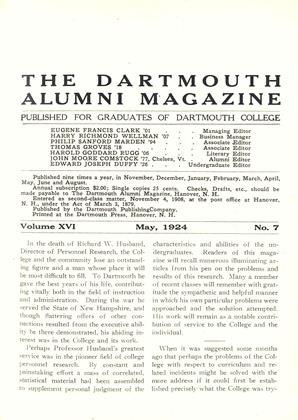By a vote of the faculty at their March meeting no student henceforth may satisfy a three-hour Dartmouth course by passing any two-hour subject in summer school. The faculty also voted to allow undergraduates to drop one of. their five courses, with certain restrictions, if, after mid-semester, they have a grade of E.
The first ruling means that if a student wishes to work off a condition in any threehour course, he must either take an equivalent three-hour course in summer school or else take two two-hour courses, thereby obtaining four semester hours credit, and at the same" time meeting the requirement, for the course. This vote relative to summer school credits also provides that no summer credit will be accepted as meeting a junior or senior requirement in a major subject except by a vote of the committee on administration.
The second vote permits undergraduates, with certain restrictions, to drop one of their five courses after mid-semester, thereby taking a failure in the course, if they have a standing of E at the time. This will affect students who find themselves swamped in a course and see no way out, and will relieve instructors of the burden of carrying men who have no hope of passing a course.
The actual votes passed by the faculty are as follows: "A student presenting a report of work passed in a summer school shall be given credit as having fulfilled a specific course requirement for his degree when and only when the . number of hours presented meets fully the corresponding hour requirement.
"No summer school credit will be accepted as meeting a junior or senior year require- ment in the major subject except by vote of the committee on administration.
"Upon written recommendation of his in- structor, and with the consent of the Dean, any student may at time after mid-semes- ter drop one of his five courses with a grade of E. This privilege will not be allowed a student in consecutive semesters • without the penalty of probation."
 View Full Issue
View Full Issue
More From This Issue
-
 Article
ArticleTHIRTY YEARS OF ALUMNI REPRESENTATION ON THE BOARD OF TRUSTEES
May 1924 By James Fairbanks Colby '72 -
 Article
ArticleFROM THE UNDERGRADUATE CHAIR
May 1924 By F. L. Janeway -
 Article
ArticleDARTMOUTH IN THE SEVENTIES III
May 1924 By Samuel L. Powers '74 -
 Article
ArticleIn the death of Richard W. Husband
May 1924 -
 Article
ArticlePROFESSOR RICHARD WELLINGTON HUSBAND
May 1924 By Charles Darwin Adams -
 Class Notes
Class NotesClass of 1903
May 1924 By Perley E. Whelden
Article
-
 Article
ArticleAlumni Articles
October 1946 -
 Article
ArticleAcademic Delegates
June 1954 -
 Article
Article'40 Rediscovers Dearie McGowen
FEBRUARY • 1988 By Dick Bowman '40 -
 Article
ArticleCOUNCIL NOTICE CONCERNING ALUMNI TRUSTEE
February 1917 By HOMER EATON KEYES -
 Article
ArticleCOLOMBIAN ALUMNI HAIL ROCKEFELLER
December 1942 By John E. Leggat '45 -
 Article
ArticleNot So Long Ago
March 1935 By R. M. Pearson '20

